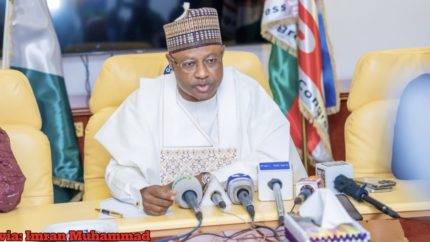Governor Uba Sani of Kaduna State has disclosed that the state government is facing a significant financial burden, with N4.7 billion deducted from its federal allocation every month to service inherited debts. According to the governor, this repayment began in June 2023, drastically reducing the state’s available funds for essential projects and governance.
Speaking on the financial constraints, Governor Sani explained that while Kaduna State should ideally be receiving around N12 billion in federal allocation, it currently only receives about N8 billion after the debt deductions. This shortfall has placed additional strain on the state’s ability to meet its obligations and pursue development initiatives.
Impact of Debt on Governance and Budgetary Allocations
Governor Uba Sani emphasized that the debt repayment has heavily impacted the state’s budgetary decisions and governance. The substantial monthly deduction limits the government’s ability to finance critical infrastructure, healthcare, and education projects. Despite this, the governor has committed to navigating these challenges through strategic financial management.
The governor pointed out that while other Northern states receive their full allocations, Kaduna’s financial capabilities are limited by the debt burden. This has forced the government to adopt cost-saving measures, including delaying major capital expenditures and streamlining administrative costs to ensure the state remains functional.
Cost-Cutting Measures and Financial Prudence
In response to the financial challenges, Governor Uba Sani has implemented a series of cost-cutting measures aimed at reducing unnecessary expenditures. He confirmed that since taking office, his administration has refrained from purchasing new vehicles for himself, the Deputy Governor, or commissioners. This decision is part of broader efforts to conserve resources and minimize government spending.
Moreover, the governor has introduced salary reductions for senior officials, including commissioners and the Deputy Governor. Governor Uba Sani himself has opted to receive only half of his salary, underlining the need for personal and institutional sacrifices in light of the state’s current financial condition.
Kaduna’s Internally Generated Revenue (IGR) Affected by Debt Obligations
Governor Uba Sani also addressed concerns regarding Kaduna State’s Internally Generated Revenue (IGR), explaining that the state’s IGR account with Zenith Bank is being directly impacted by inherited debts. He revealed that N800 million is deducted monthly from the IGR account, further constraining the state’s ability to generate and utilize revenue for development purposes.
This continuous deduction from the IGR account has limited the state’s capacity to expand its revenue base, invest in income-generating ventures, and support local industries. The governor has called for increased transparency in debt management and urged citizens to understand the financial challenges faced by the state.
Commitment to Financial Transparency and Accountability
Governor Uba Sani stressed his administration’s commitment to financial transparency and accountability. He encouraged the public and financial institutions to verify the state’s financial transactions, including the deductions from the IGR account at Zenith Bank. By promoting open access to financial records, the governor hopes to build trust and ensure that the public understands the gravity of the inherited debt situation.
The governor’s emphasis on transparency extends to the state’s allocation and expenditure reports. He believes that by keeping the public informed, the government can foster a culture of accountability, which will, in turn, encourage citizens to participate in discussions about the state’s financial health.
The Path Forward: Sacrifices and Long-Term Solutions
Despite the daunting financial circumstances, Governor Uba Sani remains optimistic about Kaduna State’s future. He highlighted the importance of strategic planning and fiscal discipline to overcome the current debt crisis. His administration is exploring long-term solutions to increase revenue generation and reduce dependency on federal allocations.
Governor Uba Sani’s leadership is focused on creating a sustainable financial model for the state, even as sacrifices are made in the short term. He expressed confidence that with prudent management and the cooperation of all stakeholders, Kaduna State can gradually overcome its debt challenges and return to a path of growth and development.
Table of Contents
Discover more from OGM News NG
Subscribe to get the latest posts sent to your email.














